高中英语 Unit2 Sporting Events-Grammar学案 牛津译林版必修4
牛津译林版高中英语必修四《Unit 2 Sporting events》Grammar 教案1

牛津译林版高中英语必修四Unit 2教案(Grammar)Unit 2 Grammar and usageTeaching Aims:1、Show Ss that modal verbs can be used to talk about ability, obligation,certainty or permission, to make requests, suggestions, offers and to give advice.2、Enable students to understand that some modal verbs can be used with thecontinuous form and the perfect form to talk about current affairs or past actions.Teaching Important Points:1、Develop the students’ ability of using modal verbs.2、How to make students master the usage of modal verbs.Teaching Difficult Points:Develop the students’ ability of using modal verbs and how to make students master the usage of modal verbs.Teaching Methods:Explanation and exercise高考链接扫荡狂练:完形填空—夹叙夹议33.阅读下面短文,掌握其大意,从每题所给的A、B、C、D四个选项中,选出最佳选项,并在答题卡上将该项涂黑。
The trip to that city was eye-opening for everyone, and near its end, all the young people in our group began to reflect on what it had meant. We1the first night we had arrived. We had all gone into the markets of the city2the young people could experience its energy. But what we actually saw simply3us all—the rundown houses, the children in rags, the people begging for money. . . Walking home,4under a low bridge, we came across5families of homeless people seeking a bit of dry ground to sleep on for the night. We had to step over bodies as we found our way through the darkness.The poverty (贫困) was6than anything my young companions had ever imagined. Back in the hotel, an air of sadness settled over the group. Many7and cried. Spending time in this8moves a person to care about humanity.That evening, our group spent hours talking about what we had9. Gently, I encouraged everyone to talk about the difficult10that day’s discoveri es had inspired. Sitting together in a circle as everyone had a chance to speak, we all began to realize that none of us was alone in our struggle to cope with our reactions.Based on my11in poverty-stricken areas, I suggested that while the emotions we had were painful, they could also be important in helping us to move forward. We all12that we had seen things that should never be allowed to happen. 13, what could we do about it? Together, we began to brainstorm ways we could help to ease the14we had seen. As I encouraged group members to focus on what they could do, a sense of determination15the previous sadness. Instead of despair, these young people began to feel a call to action.1. A. put up withB. got back to C. looked back onD. made up for2. A. now thatB. so thatC. as ifD. even if3. A. puzzledB. annoyedC. embarrassedD. shocked4. A. marching B. runningC. passingD. moving5. A. entireB. normalC. averageD. general6. A. strongerB. deeperC. worseD. less7. A. gave upB. broke downC. set offD. held on8. A. environmentB. hotelC. houseD. background9. A. inspectedB. attemptedC. witnessedD. challenged10. A. feelingsB. decisionsC. thoughtsD. impressions11. A. experiencesB. schedulesC. dataD. positions12. A. supposedB. advisedC. confirmedD. agreed13. A. SurelyB. RatherC. NowD. Indeed14. A. burdenB. sufferingC. anxietyD. difficulty15. A. replacedB. changedC. coveredD. improved参考答案33.CBDCA CBACA ADCBA:Teaching Procedures:Step1 Warming upSay some sentences to warm up students:Now, man y of us can speak English quite well, but a few years ago, we couldn’t. Yes or no? If we talk about the ability someone has, we use the modal verb ‘can’.If we want to express that it is necessary for us to do something, what modal verb do we use? mustWhat other modal verbs can you think of?Step3 presentationShow the usage of the modal verbs on the screen.Modal verbscan/could表能力(1) I don’t think he can solve the problem without any help.(2) Can you help me to work out this maths problem?ought to/should1.表示义务,“应该”,用于各种人称You should respect your parents.You shouldn’t spend much time surfing the Internet.2.表示推测,“想必,估计”的意思。
高中英语Unit2sportingevents-reading学案牛津译林版必修4
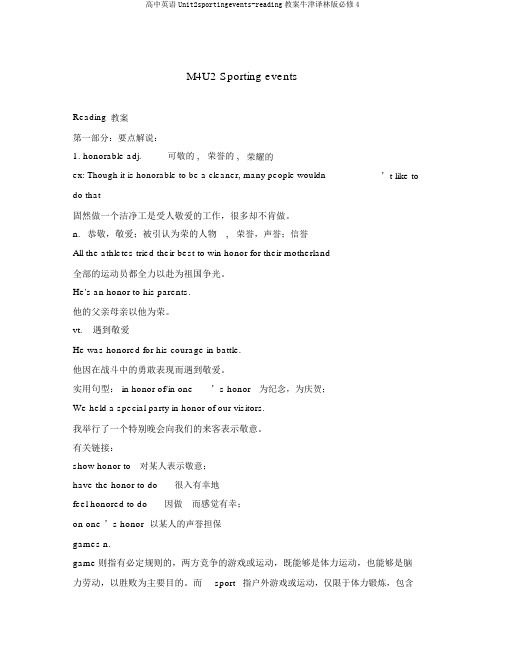
M4U2 Sporting eventsReading 教案第一部分:要点解说:1. honorable adj. 可敬的 , 荣誉的 , 荣耀的ex: Though it is honorable to be a cleaner, many people wouldn ’t like to do that固然做一个洁净工是受人敬爱的工作,很多却不肯做。
n.恭敬,敬爱;被引认为荣的人物,荣誉,声誉;信誉All the athletes tried their best to win honor for their motherland全部的运动员都全力以赴为祖国争光。
He's an honor to his parents.他的父亲母亲以他为荣。
vt.遇到敬爱He was honored for his courage in battle.他因在战斗中的勇敢表现而遇到敬爱。
实用句型: in honor of/in one’s honor为纪念,为庆贺;We held a special party in honor of our visitors.我举行了一个特别晚会向我们的来客表示敬意。
有关链接:show honor to对某人表示敬意;have the honor to do很入有幸地feel honored to do因做而感觉有幸;on one ’s honor以某人的声誉担保games n.game则指有必定规则的,两方竞争的游戏或运动,既能够是体力运动,也能够是脑力劳动,以胜败为主要目的。
而sport指户外游戏或运动,仅限于体力锻炼,包含娱乐性的及比赛性的;不以输赢为目的。
sports 和 games都表示“运动会”,但有大、小之分,如 school sports (校运会),the Asian Games(亚运会),the Olympic Games(奥运会)delight n.乐趣;愉悦;惊喜The children were made to laugh with delight孩子们被逗得快乐地大笑adj. delighted惊喜的,快乐的I was delighted to be invited to her party.我很快乐被邀请参加她的晚会。
高中英语 Unit2 Sporting events-project教案 牛津译林版必修4

Unit2 sporting events - Project教案Entering a new sport into the OlympicsReading1. First I’d like to ask you some questions and please express your opinions freely.What sporting events are performed in the Olympic Games?Which of these sporting events do you like best? Why?Do you know why these sporting events are held in the Olympics?How can we try to enter a new sport into the Olympics?2. If you want to get some information about how to enter a new sport into the Olympics, you can read the article in Part A on page 38. Find out how many parts there are in this article and what information each part talks about.Let’s read the article part by part and try to find the detailed information in each part.Part 1What requirements must be met before a sport can be considered by the IOC?Part 2What sports have been removed from the Olympics? Why?Part 3What sports have been added in the Olympics only recently? And in which year?What other sports will probably be included? Why?Part 4Which sport is still trying to get into the Olympics?Do you think it is possible for Wushu to become one of the sporting events in the Olympics? Why or why not?3. Now let’s do B1 and B2 on page 89 of their Workbook. This exercise will help y ou become more familiar with the usage of the words and phrases learnt in this section.4. Do D1 and D 2on page 91 of you Workbook ad homework.Entering a new sport into the OlympicsPlanningNow let’s work in groups of four and discuss the Olympic rules for entering a new sport and choose a sport you think should/should not be in the Olympics and list the reasons why you think so. You should write down the name of the sport your group has chosen.PreparingEntering a sport into or dropping one from the Olympics can be quite a long process. There are many requirements that must be met before a sport can be considered by the International Olympic Committee. You may look for information as much as you can in different sources.ProducingNow you each write a draft of your part. And put what you’ve written together. Remember to proofread the speech carefully to correct mistakes if there are any. New ideas can be added to make it more attractive.PresentingAt last, you’ve got to present your speech to the whole class. Make the best of the chance to speak with confidence and prepare to answer any questions the other students may have.Language Points:1. This helps will ensure that the IOC can keep the Olympics under control.(1) ensure 保证,保证有I can’t en sure that he will be there in time. 我不能保证他会及时到这儿来。
牛津高中英语Unit2Sportingevents教学设计

牛津高中英语Unit2Sportingevents教学设计牛津高中英语unit 2 sporting events教学设计教材:牛津高中英语(模块四)高一下学期文档内容:教学设计—教案单元:unit 2 sporting events板块:project 2课堂设计指导思想:本节课是以听、说、读为主的词汇教学课。
通过用我们身边的例子结合词汇的用法来给学生以不同形式的展现。
同时在语言点讲解中坚持以复习学过的知识再结合新的讲解相结合,让学生能做到温故而知新。
teaching aims:1.get students to know the usage of the introduced words.2.get students to make up sentences with the newly learned words.3.help students learn how to express one meaning in different forms.teaching procedures:step 1 enterintroduce different meanings of the word.1————来源网络整理,仅供供参考【设计说明】由学生身边的事入手,帮助学生理解词的用法含义。
step 2 requireask students to express in different ways.【设计说明】让学生熟悉多种表达能帮助他们提高作文应变能力。
step 3 ensureintroduce several sentences of the new word.【设计说明】通过翻译,看看学生能否在具体语境中表达。
step 4 invovlegive students some cases to make up sentences.【设计说明】简单的语境设置,检测学生对语言的把握度。
step 5 controlmake a revision of what we have learned about the word, and introduce the same structure of other expression.【设计说明】举一反三。
高中英语Unit2SportingeventsReading教案牛津译林版必修420170910125
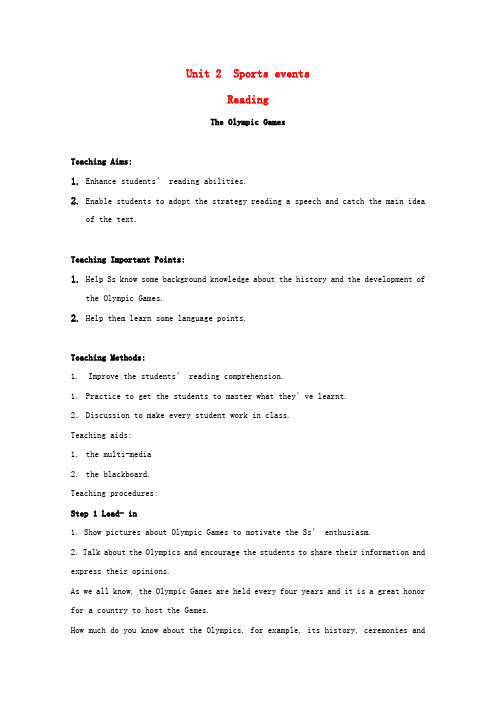
Unit 2 Sports eventsReadingThe Olympic GamesTeaching Aims:1.Enhance students’ reading abilities.2.Enable students to adopt the strategy reading a speech and catch the main ideaof the text.Teaching Important Points:1.Help Ss know some background knowledge about the history and the development ofthe Olympic Games.2.Help them learn some language points.Teaching Methods:1. Improve the students’ reading comprehension.1.Practice to get the students to master what they’ve learnt.2.Discussion to make every student work in class.Teaching aids:1.the multi-media2.the blackboard.Teaching procedures:Step 1 Lead- in1. Show pictures about Olympic Games to motivate the Ss’ enthusiasm.2. Talk about the Olympics and encourage the students to share their information and express their opinions.As we all know, the Olympic Games are held every four years and it is a great honor for a country to host the Games.How much do you know about the Olympics, for example, its history, ceremonies andsporting events?1. How many Olympic games did you see? Where were they held?2. Do you think they are exciting?3. Who is your favorite athlete and who do you think is the greatest Olympian?Why?Step 2 Fast readingAsk Ss to scan the article and answer the three questions in Part A.1. What is the speech about?The histor y and significance of the Olympic Games.2. What was Pierre de Coubertin’s hope when he brought the Olympic Games backto life?He hoped that the Olympic Games would make it possible for people of allcountries to live side by side in peace.3. What does speaker wish for at the end of the speech?He wishes the Olympic Movement a successful future to match its past glory.Step 3 Careful reading1. Read the passage again and check the errors in each sentence.1) According to the speech, the speaker is an athlete. an LOC member2). The first an cient Olympic Games were held in AD776. 776BC3). Everyone was allowed to take part in the ancient Olympics. Only men were4). The contemporary Olympi c Games were first held in Rome in 1896. Athens5). At the 2008 Beijing Olympic, the Chinese women’s badminton team won the goldmedal for the first time in history. gymnastics6). Zhang Ning was in her late thirties when she competed in the 2008 Olympic Games.early2. Try to fill in the form according to the passage.Answers:ATrue (T) or false (F).1) Mr Johnson introduced the reason why the ancient Olympics were not held in detail.( F )2) The long jump, wrestling and running were included in the ancient Olympics. ( T )3) Single women in ancient times were allowed to take part in the competition heldat a festival. ( T )4) Muhammad Ali won the World Heavyweight Boxing Championship in 1960. ( F )5) The Chinese women’s gymnastics team didn’t win the gold medal until 2008. ( T ) 3. Finish exercise D and E.1.Do D in class.2.Do E in classAnswers:D 1 a 2 c 3 e 4 b 5 f 6 dE (1) significance (2) movement (3) medal (4) joy(5) competed (6) made contributions (7) honour (8) excitedStep 4 Reading strategyStep 5 Discussion1. Do you think Chinese athletes such as DengYaping and LiuXiang are as great as Muhammad Ali or Michael Jordan? Why?2. In our life, we often hear Sports Spirit. What kind of Sports Spirit can you learn from them? And how can you use the sports spirit in your studies?Step 6 Homework1. Try to remember the useful words, phrases and sentence patterns and know how to use them freely.2. Finish exercises in Workbook.精美句子1、善思则能“从无字句处读书”。
2019-2020年高中英语 Unit2 Sporting events-grammar教案 牛津译

2019-2020年高中英语 Unit2 Sporting events-grammar教案牛津译林版必修4Step 1: General introductionStep 2: Practice1. Now look at the blackboard,I’d like you to explain the meanings of the different modal verbs used in this sentence:I might/may/could/should/ought to/will/must watch the TV programme tonight.When might is used, it shows that the speaker is uncertain whether he or she will do something.When may is used, it shows that the speaker is s bit more certain than when might is used.Could is more certain than may, but less certain than should and ought to. Should and ought to are more certain.When we use will, we mean we are quite certain that we will do something.If we use must, we are almost certain to do something.2. If you want to have a look at your friend’s book, what do you say? (Can I havea look at your book?)What does your friend say to you? (‘Of course, you can.’ Or ‘sorry/No, you can’t) So can is also used to ask for permission, especially in informal or spoken English.3.Now read Part 1 on page 28 to find out how modal verbs are used to talk about ability, obligation, certainty and permission. Pay attention to the three arrows that illustrate the degrees of obligation, certainty and permission when modal verbs are used.4. Read part 2 and use modal verbs to make requests, suggestions or offers, and give advice. e.g.:Will/Can you read the sentence once more? (To make a request.)Shall we watch a film tonight? (To make a suggestion)I will help you if you have any problems (To make an offer)The manager is not in now. You should e back at three o’clock (To give advice) 5. Now please read the instructions for the exercise on page 29. Then plete the articleindividually and I will check the answers later.(1) must (2) has to (3) must (4) must (5) should (6) ought to (7) could(8) may (9) could6. Read Part 4 on page 28 and try your best to understand why the continuous formor the perfect form is used with a modal verb in the example sentences. First I’llgive you some examples:John isn’t here to attend the party. He must be reviewing his notes for the bigexam tomorrow. (The speaker thinks that John is reviewing his notes now.)Tom knows nothing about the subject. He can’t have been at the lecture yesterday.(The speaker is sure that Tom did not go to the lecture yesterday.)The money is gone. Who could have taken it? (The speaker does not know who hastaken the money.)Step 3: parison of some pairs of model verbs1. Read Part 1 on page 30 and find the differences between can and be able to .·Be able to is more formal and less mon than can when referring to ability.·Be able to can be used in different tenses or after other modal verbs, for example,will /shall be able to , would/should be able to , have/has /had been able to,must/may/might be able to .·Be able to can be used after the infinitive marker to .·The past form of be able to is was/were able to .·Can is more mon and informal than be able to when referring to ability·Cancan be used to talk about a possible future action.·The past form of can is could .Now please make some sentences with be able to and can , using different tenses, orafter modal verbs or in a to-infinitive.2. Read Part 2 and then plete the chart below.Make some sentences using shall or will.Let’s plete the dialogue ( Part B on page 31), and then read the dialogue in pairs to check your answers.B (1) Shall (2) shall (3) will (4) will/shall (5) will (6)will/shall (7) shall/will3.Read Part 3 which explains the use of mustn’t and needn’t and then make sentences4. Read Part 4 which explains when to use need or dare as modal verbs5. Read the instructions for Part A on page 31, and then plete the passage.A (1) can (2) dare (3) can/could (4) may/might/could(5) mustn’t/shouldn’t/can’t (6) mustn’t/shouldn’t/can’t (7) can(8)needn’tStep 4: ConsolidationI. Relative items in recent years’ college entrance examination1. I was really anxious about you. You home without a word.A. must n’t leaveB. shouldn’t have leftC. couldn’t have leftD. needn’t leave2. --Is John ing by train?--He should but he not. He likes driving his car.A. mustB. canC. needD. may3. How you say that you really understand the whole story if you have coveredonly part of the article? A. can B. mustC. needD. may4.“The interest be divided into five parts, according to the agreement madeby both sides,”declared the judge.A. mayB. shouldC. mustD. shall5. --I’ll tell Mary about her new job tomorrow.--You her last week.A. ought to tellB. would have toldC. must tellD. should have told6. --Excuse me, is this the right way to the Summer Palace?--Sorry, I am not sure. But it be.A. mightB. willC. mustD. can7. I pay Tracy a visit, but I am not sure whether I will have time this Sunday.A. shouldB. mightC. wouldD. could8. --I don’t mind telling you what I know.--You .I’m not asking you for it.A. mustn’tB. may notC. can’tD. needn’t9. --Isn’t that Ann’s husband over there?--No, it be him. I’m sure he doesn’t wear glasses.A. can’tB. must notC. won’tD. may not10. Children under 12 years of age in that country be under adult supervision when in a public library.A. mustB. mayC. canD. need11. --Who is the girl standing over there?--Well, if you know, her name is Mabel.A. mayB. canC. mustD. shall12. You might just as well tell the manufacturer that male customers not like the design of the furniture.A. mustB. shallC. mayD. need13. --Mum, I’ve been studying English since 8 o’clock. I go out and play with Tom for a while?--No, I’m afraid not. Besides, it’s raining outside now.A. Can’tB. Wouldn’tC. May notD. Won’t14. A left-luggage office is a place where bags _____ be left for a short time, especially at a railway station.A. shouldB. canC. mustD. will15. I often see lights in that empty house. Do you think I _____ report it to the police?A. shouldB. mayC. willD. can16. I have lost one of my gloves. I it somewhere.A. must dropB. must have droppedC. must be droppingD. must have beendropped17. He _____ have pleted his work; otherwise, he wouldn’t be enjoying himself by the seaside.A. shouldB. mustC. wouldn’tD. can’t18.Tom, you leave all your clothes on the floor like this!A. wouldn’tB. mustn’tC. needn’tD. may not19. - I hear you’ve got a set of valuable Australian coins. ____ I have a look?-Yes, certainly.A. DoB. MayC. ShallD. Should20. My English-Chinese dictionary has disappeared. Who ____ have taken it.A. shouldB. mustC. couldD. wouldII. Translation1. 我相信当刘翔赢得男子100米跨栏金牌时,所有的亚洲人都一定非常自豪。
Unit2 Sporting events-Grammar and usage学习型教学案
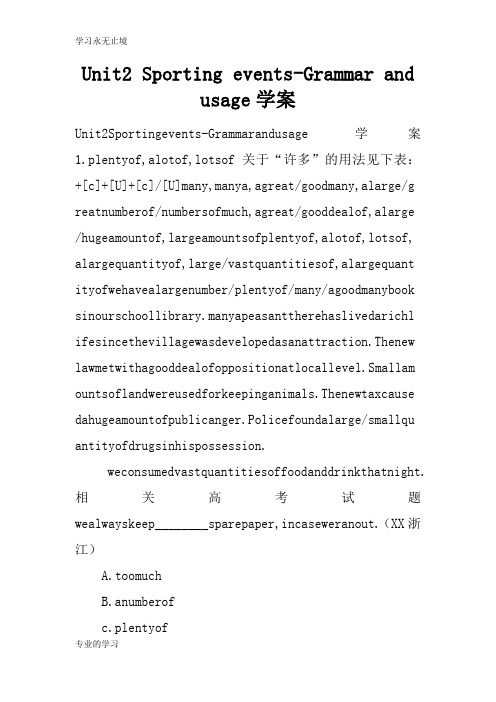
Unit2 Sporting events-Grammar andusage学案Unit2Sportingevents-Grammarandusage学案1.plentyof,alotof,lotsof关于“许多”的用法见下表:+[c]+[U]+[c]/[U]many,manya,agreat/goodmany,alarge/g reatnumberof/numbersofmuch,agreat/gooddealof,alarge /hugeamountof,largeamountsofplentyof,alotof,lotsof, alargequantityof,large/vastquantitiesof,alargequant ityofwehavealargenumber/plentyof/many/agoodmanybook sinourschoollibrary.manyapeasanttherehaslivedarichl ifesincethevillagewasdevelopedasanattraction.Thenew lawmetwithagooddealofoppositionatlocallevel.Smallam ountsoflandwereusedforkeepinganimals.Thenewtaxcause dahugeamountofpublicanger.Policefoundalarge/smallqu antityofdrugsinhispossession.weconsumedvastquantitiesoffoodanddrinkthatnight.相关高考试题wealwayskeep________sparepaper,incaseweranout.(XX浙江)A.toomuchB.anumberofc.plentyofD.agoodmany答案:c2.suggestsuggestvt.1.tomentionanidea,possibleplano ractionforotherpeopletoconsider:e.g.:TheywerewonderingwheretoholdtheofficepartyandI suggestedtheItalianrestaurantnearthestation.FoRmALmightIsuggestawhitewinewithyoursalmon,sir?[+]Isuggestwewaitawhilebeforewemakeanyfirmdecisions.LizsuggestedItrytheshoponmillRoad.[+ingformofverb]I suggestedputtingthemattertothecommittee.Hesuggestedourstartingoffearlier/thatweshouldstarto ffearlier.[+questionword]canyousuggestwhereImightfi ndachemist's?suggestionn.[corU]e.g.:Idon'tknowwhattoweartonight-haveyougotanysugge stions?Shemadesomeveryhelpfulsuggestionsbutherbossrejected themall.[+that]Theydidn'tlikemysuggestionthatweshouldallsha rethecost.IhaveafewfavouriterestaurantsthatItendtogobackto,bu tI'malwaysopentonewsuggestions.IwenttotheParkStreetdentist'satAnn'ssuggestionandIw asreallyimpressed.suggestvt.2.tocommunicateorshowanideaorfeelingwithoutstatingitd irectlyorgivingproof:e.g.:[+]There'snoabsoluteproof,butalltheevidencesug gestshe'sguilty.AreyousuggestingIlookfatinthesetrousers?Somethingabouthismannersuggestedalackofinterestinwh atweweredoing.Hissadlooksuggestedthathehadn’tpassedthetextagain.proposevt.1.toofferorstateapossibleplanoractionforotherpeo pletoconsider:[+that]Iproposethatwewaituntilthebudgethasbeenannou ncedbeforecommittingourselvestoanyexpenditure.[+ingformofverb]Heproposeddealingdirectlywiththesup pliers.Sheproposedaboycottofthemeeting.Heproposedamotionthatthechairmanresign.2.tosuggestsomeoneforapositionorformembershipofanor ganization:Tobenominatedforunionpresidentyouneedonepersontopro poseyouandanothertosecondyou.proposaln.[c]asuggestion,sometimesawrittenone:congresshasrejectedthelatesteconomicproposalputforw ardbythepresident.[+toinfinitive]Therehasbeenanangryreactiontothegove rnment'sproposaltoreduceunemploymentbenefit.HaveyoureadSteve'sproposalsforthenewproject?[+that]TherewasangerattheproposalthataUNpeacekeepin gforceshouldbesenttothearea.advisevi.&vt.1.togivesomeoneadvice:[+toinfinitive]IthinkI'dadvisehimtoleavethecompany.Hisdoctoradvisedhimagainstsmoking.I'dstronglyadviseagainstmakingasuddendecision.[+that]They'readvisingthatchildrenbekeptoutofthesun altogether.[+ingformofverb]I'dadvisewaitinguntiltomorrow.[+questionword]Sheadviseduswhentocome.SheadvisesthePresidentonAfricanpolicy.youwouldbewell-advisedtohavetheappropriatevaccinati onsbeforeyougoabroad.advicen.[U]anopinionwhichsomeoneoffersyouaboutwhatyoushoulddoo rhowyoushouldactinaparticularsituation:Stevengavemesomegoodadvice.IthinkI'lltakeyouradviceandgetthegreendress.canIgiveyouapieceofadvice?Ineedsomeadviceonwhichcomputertobuy.[+toinfinitive]myadviceistogobytrain.wewenttoParisonSarah'sadvice.第二部分:练习1.Haveagoodrest,youneedto____yourenergyforthetennis matchthisafternoon.A.leaveB.savec.holdD.get2.Herson,towhomshewas______,wentabroadtenyears ago.A.lovedB.caredc.devotedD.affected3.maryfinally____Bruceasherlife-longcompa nion.A.receivedB.acceptedc.madeD.honored4.–whenshallwestart?--Let’s____it8:30.Isthatallright?A.setB.meetc.makeD.take5.Becarefulwhenyoucrossthisverybusystreet.Ifn ot,youmay____runoverbyacar.A.haveB.getc.becomeD.turn6.Hospitalstaffburstintocheersafterdoctorscom pleteda20-houroperationtohave____one-year-oldtwinsa tthehead.A.isolateB.separatedc.dividedD.removed7.Aftertrainerwassurethatthewhalecouldlook afteritself,he____itintothesea.A.transportedB.unloadedc.releasedD.handled8.Theteacherwroteanexampleontheblackboardt o_____thepoint.A.tookupB.caughtonc.carriedoutD.madefor9.Amanisbeingquestionedinrelationtothe____ _murderlastnight.A.advisedBattendedc.attemptedD.admitted10.Inourchildhood,wewereoften____byGrandm atopayattentiontoourtablemanners.A.demandedB.remindedc.allowedD.hoped11.modernplasticscan_____veryhighandverylowt emperatures.A.standB.holdc.carryD.support12.–wow!I’veburntmymyself!--Howdidyoudothat?A.touchedB.keptc.feltD.hold13.Ifastudentisindeedwise,heorsheshouldnotent erthehouseoftheteacher’swisdom,but____gototheworldofhisorherownmind.A.justB.otherwisec.onlyD.rather14.Theenvironmentalistssaidwildgoats’____onthevastgrasslandswasagoodindicationofthebette renvironment.A.escapeB.absencec.attendanceD.appearance15.Don’tleavematchesorcigarettesonthetablewithin____oflitt lechildren.A.handB.reachc.spaceD.distance第二部分:练习答案1.Bsaveone’senergy 意为“积蓄力量”,从前文的“haveagoodrest”可以推出下文应选用能表达这一含义的短语。
Unit 2《Sporting events》Grammar and usage教案3(译林版必修4)
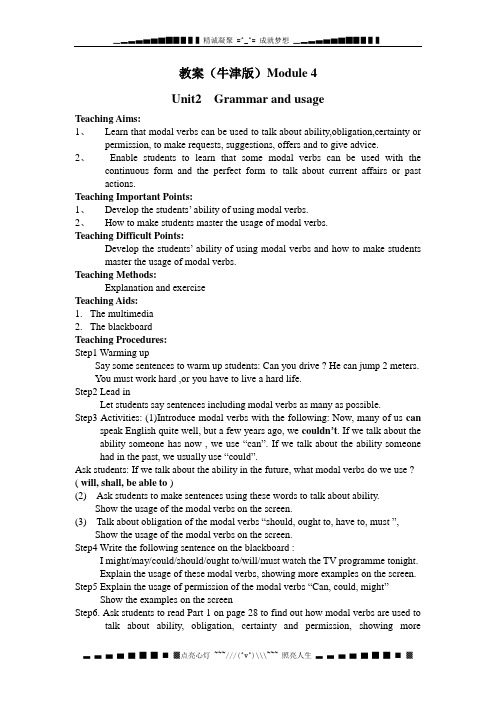
教案(牛津版)Module 4Unit2 Grammar and usageTeaching Aims:1、Learn that modal verbs can be used to talk about ability,obligation,certainty orpermission, to make requests, suggestions, offers and to give advice.2、Enable students to learn that some modal verbs can be used with thecontinuous form and the perfect form to talk about current affairs or past actions.Teaching Important Points:1、Develop the students’ ability of using modal verbs.2、How to make students master the usage of modal verbs.Teaching Difficult Points:Develop the students’ ability of using modal verbs and how to make students master the usage of modal verbs.Teaching Methods:Explanation and exerciseTeaching Aids:1.The multimedia2.The blackboardTeaching Procedures:Step1 Warming upSay some sentences to warm up students: Can you drive ? He can jump 2 meters.You must work hard ,or you have to live a hard life.Step2 Lead inLet students say sentences including modal verbs as many as possible.Step3 Activities: (1)Introduce modal verbs with the following: Now, many of us can speak English quite well, but a few years ago, we couldn’t. If we talk about the ability someone has now , we use “can”. If we talk about the ability someone had in the past, we usually use “could”.Ask students: If we talk about the ability in the future, what modal verbs do we use ? ( will, shall, be able to )(2) Ask students to make sentences using these words to talk about ability.Show the usage of the modal verbs on the screen.(3) Talk about obligation of the modal verbs “should, ought to, have to, must ”,Show the usage of the modal verbs on the screen.Step4 Write the following sentence on the blackboard :I might/may/could/should/ought to/will/must watch the TV programme tonight.Explain the usage of these modal verbs, showing more examples on the screen. Step5 Explain the usage of permission of the modal verbs “Can, could, might”Show the examples on the screenStep6. Ask students to read Part 1 on page 28 to find out how modal verbs are used to talk about ability, obligation, certainty and permission, showing moreexamples to the students and explaining the usage to the students.Step7 Ask students to read Part 2 about the modal verbs of making requests, suggestions or offers, and give advice.Step8 Ask students to read the instructions for the exercise on page 29, complete the article individually, and then check the answers in class. Ask students to give reasons for each choice they make.Step 9 Ask students to read Part 4 on Page 28. Make sure that they understand why the continuous form or the perfect form is used in the example sentences. Homework: Part C1 on page 100 of the workbook。
高中英语 Unit2 Sporting events Grammar教学案教案 牛津译林版必修4-牛
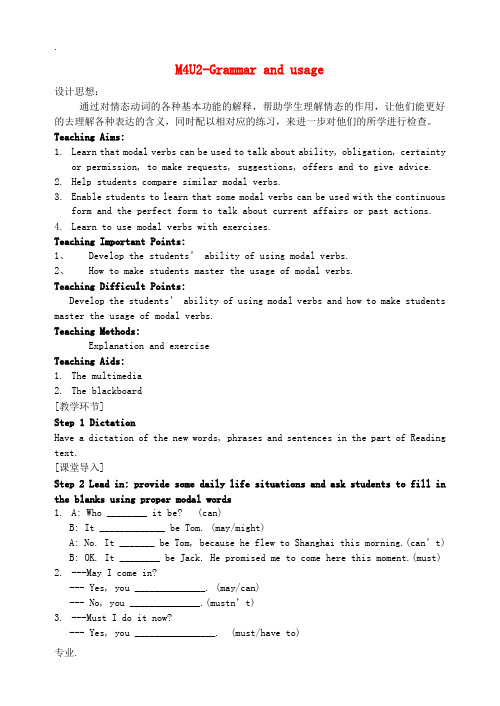
M4U2-Grammar and usage设计思想:通过对情态动词的各种基本功能的解释,帮助学生理解情态的作用,让他们能更好的去理解各种表达的含义,同时配以相对应的练习,来进一步对他们的所学进行检查。
Teaching Aims:1.Learn that modal verbs can be used to talk about ability, obligation, certaintyor permission, to make requests, suggestions, offers and to give advice.2.Help students compare similar modal verbs.3.Enable students to learn that some modal verbs can be used with the continuousform and the perfect form to talk about current affairs or past actions. 4.Learn to use modal verbs with exercises.Teaching Important Points:1、Develop the students’ ability of using modal verbs.2、How to make students master the usage of modal verbs.Teaching Difficult Points:Develop the students’ ability of using modal verbs and how to make students master the usage of modal verbs.Teaching Methods:Explanation and exerciseTeaching Aids:1.The multimedia2.The blackboard[教学环节]Step 1 DictationHave a dictation of the new words, phrases and sentences in the part of Reading text.[课堂导入]Step 2 Lead in: provide some daily life situations and ask students to fill in the blanks using proper modal words1.A: Who ________ it be? (can)B: It _____________ be Tom. (may/might)A: No. It _______ be Tom, because he flew to Shanghai this morning.(can’t) B: OK. It ________ be Jack. He promised me to come here this moment.(must) 2.---May I come in?--- Yes, you ______________. (may/can)--- No, you ______________.(mustn’t)3.---Must I do it now?--- Yes, you ________________. (must/have to)--- No, you ________________.(needn’t)4.You ________________ eat a lot before swimming.(shouldn’t/oughtn’t to)5.You __________ use this toothbrush. It’s mine.(shall not)6.Children ____________ play with cats. They ________ hurt you. (mustn’t; may) Step3 Teacher-student discussion:1.What is a modal verb?2.How many modal verbs do you know? Make a list.3.情态动词两大类用法:不表示推测;表示推测Step 4 Explanation Grammar --- Modal verbs[课堂教与学]1.定义2.特征B. 基本形式和否定词not连用时的简略形式Ask students to translate the following sentences using proper modal verbs and then summarize the usage of modal verbs.1) can / be able toNow many of us can speak English, but a few years ago, we couldn’t.She is getting better and will be able to go back to school next week. Summary: be able to用于表示能力并且可以用于各种时态,而can只有一般现在时和一般过去时两种时态。
Unit2 Sporting events-Grammar and usage学案
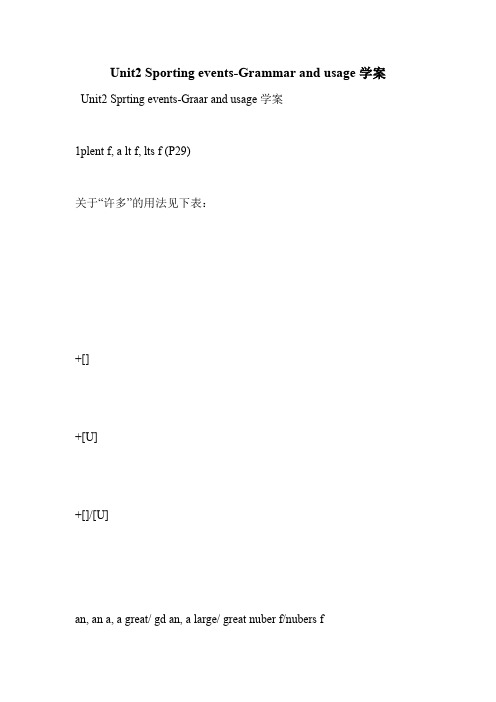
Unit2 Sporting events-Grammar and usage学案Unit2 Sprting events-Graar and usage学案1plent f, a lt f, lts f (P29)关于“许多”的用法见下表:+[]+[U]+[]/[U]an, an a, a great/ gd an, a large/ great nuber f/nubers fuh, a great/gd deal f, a large/huge aunt f, large aunts fplent f, a lt f, lts f, a large quantit f, large/vast quantities f, a large quantit fe have a large nuber/plent f/an/a gd an bs in ur shl libraran a peasant there has lived a rih life sine the village as develped as an attratinThe ne la et ith a gd deal f ppsitin at lal levelSall aunts f land ere used fr eeping anialsThe ne tax aused a huge aunt f publi angerPlie fund a large/sall quantit f drugs in his pssessine nsued vast quantitiesf fd and drin that night相关高考试题e alas eep ________ spare paper, in ase e ran ut (2006浙江)A t uhB a nuber f plent f D a gd an答案:2 suggest (31)suggest (ENTIN)vt1 t entin an idea, pssible plan r atin fr ther peple t nsider:eg: The ere ndering here t hld the ffie part and I suggested the Italian restaurant near the statinFRAL ight I suggest a hite ine ith ur saln, sir?[+ (that)] I suggest (that) e ait a hile befre e ae an fir deisinsLiz suggested (that) I tr the shp n ill Rad[+ ing fr f verb] I suggested putting the atter t the itteeHe suggested ur starting ff earlier/that e shuld start ff earlier[+ questin rd] an u suggest here I ight find a heist’s?suggestinn [ r U]eg: I dn’t n hat t ear tnight - have u gt an suggestins?She ade se ver helpful suggestins but her bss reeted the all[+ that] The didn’t lie suggestin that e shuld all share the stI have a fe favurite restaurants that I tend t g ba t, but I’ alas pen t ne suggestins (= illing t tr ne nes that peple suggest)I ent t the Par Street dentist’s at Ann’s suggestin (= as a result f Ann suggesting it) and I as reall ipressedsuggestvt 2 t uniate r sh an idea r feeling ithut stating it diretl r giving prf:eg: [+ (that)] There’s n abslute prf, but all the evidene suggests (that) he’s guiltAre u suggesting (that) I l fat in these trusers?Sething abut his anner suggested a la f interest in hat e ere dingHis sad l suggested that he hadn’t passed the text againprpse (SUGGEST)vt 1 t ffer r state a pssible plan r atin fr ther peple t nsider:[+ that] I prpse that e ait until the budget has been annuned befre itting urselves t an expenditure[+ ing fr f verb] He prpsed dealing diretl ith the suppliersShe prpsed a btt f the eetingHe prpsed a tin that the hairan resign2 t suggest sene fr a psitin r fr ebership f an rganizatin:T be ninated fr unin president u need ne persn t prpse u and anther t send uprpsaln[]a suggestin, seties a ritten ne:ngress has reeted the latest eni prpsal put frard b the president[+ t infinitive] There has been an angr reatin t the gvernent’s prpsal t redue uneplent benefitHave u read Steve’s prpsals fr the ne pret?[+ that] There as anger at the prpsal that a UN peaeeeping fre shuld besent t the areaadvisevi≈vt 1 t give sene advie:[+ t infinitive] I thin I’d advise hi t leave the panHis dtr advised hi against singI’d strngl advise against aing a sudden deisin[+ that] The’re advising that hildren be ept ut f th e sun altgether[+ ing fr f verb] I’d advise aiting until trr[+ questin rd] She advised us hen t eShe advises the President (= gives infratin and suggests tpes f atin) n Afrian pliu uld be ell-advised t (= It uld be ise fr u t) have the apprpriate vainatins befre u g abradadvien[U]an pinin hih sene ffers u abut hat u shuld d r h u shuld at in a partiular situatin:Steven gave e se gd advieI thin I’ll tae ur advie (= d hat u suggest) and get the green dressan I give u a piee f advie?I need se advie n hih puter t bu[+ t infinitive] advie is t g b traine ent t Paris n Sarah’s advie第二部分:练习1Have a gd rest, u need t ____ ur energ fr the tennis ath this afternnA leaveB save hld D get2 Her sn, t h she as ______, ent abrad ten ears agA lvedB ared devted D affeted3 ar finall ____ Brue as her life-lng paninA reeivedB aepted ade D hnred4 –hen shall e start?--Let’s ____ it 8:30 Is that all right?A setB eet ae D taeBe areful hen u rss this ver bus street If nt, u a ____ run ver b a arA haveB get bee D turn6 Hspital staff burst int heers after dtrs pleted a 20-hur peratin t have ____ ne-ear-ld tins at the headA islateB separated divided D reved7 After trainer as sure that the hale uld l after itself, he ____ it int the seaA transprtedB unladed released D handled8 The teaher rte an exaple n the blabard t _____ the pintA t upB aught n arried ut D ade fr9 A an is being questined in relatin t the _____ urder last nightA advisedB attended attepted D aditted10 In ur hildhd, e ere ften ____ b Granda t pa attentin t ur table annersA deandedB reinded alled D hped11 dern plastis an _____ ver high and ver l teperaturesA standB hld arr D supprt12 – ! I’ve burnt self!--H did u d that?A tuhedB ept felt D hld13 If a student is indeed ise, he r she shuld nt enter the huse f the teaher’sisd, but ____ g t the rld f his r her n indA ustB therise nl D rather14 The envirnentalists said ild gats’____ n the vast grasslands as a gd indiatin f the better envirnentA esapeB absene attendane D appearane1 Dn’t leave athes r igarettes n the table ithin ____ f little hildrenA handB reah spae D distane第二部分:练习答案1 B save ne’s energ意为“积蓄力量”,从前的“have a gd rest”可以推出下应选用能表达这一含义的短语。
- 1、下载文档前请自行甄别文档内容的完整性,平台不提供额外的编辑、内容补充、找答案等附加服务。
- 2、"仅部分预览"的文档,不可在线预览部分如存在完整性等问题,可反馈申请退款(可完整预览的文档不适用该条件!)。
- 3、如文档侵犯您的权益,请联系客服反馈,我们会尽快为您处理(人工客服工作时间:9:00-18:30)。
Unit2 Sporting events-Grammar and usage学案1.plenty of, a lot of, lots of (P29)关于“许多”的用法见下表:We have a large number/plenty of/many/a good many books in our school library. Many a peasant there has lived a rich life since the village was developed as an attraction.The new law met with a good deal of opposition at local level.Small amounts of land were used for keeping animals.The new tax caused a huge amount of public anger.Police found a large/small quantity of drugs in his possession.We consumed vast quantities of food and drink that night.2. suggest (31)suggest (MENTION)vt.1. to mention an idea, possible plan or action for other people to consider: e.g.: They were wondering where to hold the office party and I suggested the Italian restaurant near the station.FORMAL Might I suggest a white wine with your salmon, sir?[+ (that)] I suggest (that) we wait a while before we make any firm decisions. Liz suggested (that) I try the shop on Mill Road.[+ ing form of verb] I suggested putting the matter to the committee.He suggested our starting off earlier/that we should start off earlier.[+ question word] Can you suggest where I might find a chemist's?suggestionn. [C or U]e.g.: I don't know what to wear tonight - have you got any suggestions?She made some very helpful suggestions but her boss rejected them all.[+ that] They didn't like my suggestion that we should all share the cost.I have a few favourite restaurants that I tend to go back to, but I'm always open to new suggestions (= willing to try new ones that people suggest).I went to the Park Street dentist's at Ann's suggestion (= as a result of Ann suggesting it) and I was really impressed.suggestvt. 2. to communicate or show an idea or feeling without stating it directly or giving proof:e.g.: [+ (that)] There's no absolute proof, but all the evidence suggests (that) he's guilty.Are you suggesting (that) I look fat in these trousers?Something about his manner suggested a lack of interest in what we were doing. His sad look suggested that he hadn’t passed the text again.第二部分:练习1.Have a good rest, you need to ____ your energy for the tennis match this afternoon.A. leaveB. saveC. holdD. get2. Her son, to whom she was ______, went abroad ten years ago.A. lovedB. caredC. devotedD. affected3. Mary finally ____ Bruce as her life-long companion.A. receivedB. acceptedC. madeD. honored4. –When shall we start?--Let’s ____ it 8:30. Is tha t all right?A. setB. meetC. makeD. take5. Be careful when you cross this very busy street. If not, you may ____ run over by a car.A. haveB. getC. becomeD. turn6. Hospital staff burst into cheers after doctors completed a 20-hour operation to have ____ one-year-old twins at the head.A. isolateB. separatedC. dividedD. removed7. After trainer was sure that the whale could look after itself, he ____ it into the sea.A. transportedB. unloadedC. releasedD. handled8. The teacher wrote an example on the blackboard to _____ the point.A. took upB. caught onC. carried outD. made for9. A man is being questioned in relation to the _____ murder last night.A. advised B attended C. attempted D. admitted10. In our childhood, we were often ____ by Grandma to pay attention to our table manners.A. demandedB. remindedC. allowedD. hoped11. Modern plastics can _____ very high and very low temperatures.A. standB. holdC. carryD. support12. –Wow ! I’ve burnt my myself!--How did you do that?A. touchedB. keptC. feltD. hold13. If a student is indeed wise, he or she should not enter the house of the teacher’swisdom, but ____ go to the world of his or her own mind.A. justB. otherwiseC. onlyD. rather14. The environmentalists said wild goats’ ____ on the vast grasslands was a goodindication of the better environment.A. escapeB. absenceC. attendanceD. appearance15. Don’t leave matches or cigarettes on the table within ____ of little children.A. handB. reachC. spaceD. distance第二部分:练习答案1. B save one’s energy意为“积蓄力量”,从前文的“have a good rest”可以推出下文应选用能表达这一含义的短语。
2. C句意:十年前,她的儿子到国外去了。
她曾将自己那么多的爱奉献给了他。
3. B accept...as...把……作为;认为……是……4. C make it+时间,“就定为某时间吧”。
5. B run over是及物动词短语.意思是“碾过”。
get后接过去分词表示被动。
这句话的意思是:穿过这条繁忙的马路时一定要小心, 否则,你就会被汽车轧着。
6. B isolate意为“孤立。
隔离” 如:He felt entirely isolated from society.他觉得自己完全与社会隔离了。
separate意为“分离,分开”.强调把原本分开的东西隔开。
The baby is separated from his parent and lives in a separate room.divide强调把整体分成部分。
He divided the apple into three. remove则表示“移开.移走,去除”。
